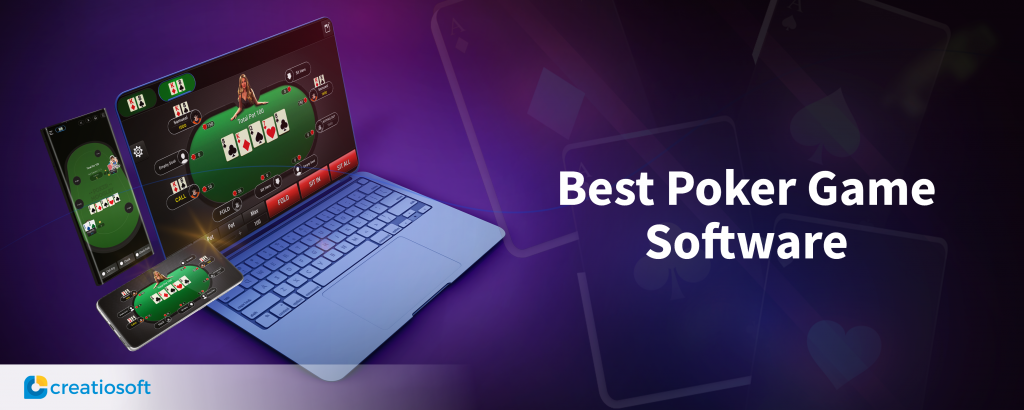Introduction:
“Stacking Chips: Exploring Play-to-Earn Poker Game Development” is a welcome addition. Come along as we examine the realm of play-to-earn (P2E) gaming, with a particular emphasis on P2E poker game development. Find out how decentralized finance and blockchain poker development technologies are changing the gaming business. For developers, players, and curious minds alike, our series delves into the benefits, challenges, and future of P2E poker. If you are looking to hire a poker development company then this is a thorough rundown of the actions that a game development business can take:
Recognizing the Play-to-Earn Gaming Framework
The play-to-earn (P2E) concept is revolutionizing traditional gaming. Through gameplay, it allows users to gain real-world value. By engaging in in-game actions, gamers in P2E games can get paid.
The player-owned assets (P2E) approach revolves around virtual items and digital tokens. Blockchain poker development has resulted in significant advancements in online poker. NFTs stand for exclusive in-game items. These assets are truly owned by gamers because they keep them on blockchain networks. They can move them around, trade them, or make money off of them outside of the game.”
Through jobs and tournaments, players in P2E games might earn valuable assets, tokens, or awards. They can also engage in trade, crafting, or government support of the game’s economy. You can trade these awards for other cryptocurrencies or fiat money.
With the advent of blockchain technology, the P2E gaming concept has gained strength. It provides transparent & decentralized infrastructure for asset ownership, transactions, & verifying digital asset scarcity. P2E games give players more freedom, security, and interoperability by utilizing blockchain technology.
Additionally, the P2E model encourages community and player involvement. The success of the game and the economy directly affect the players. Encouraging players to contribute positively through gameplay, content creation, or community-building.
Although it presents difficulties, the P2E model allows participants to make money. The developers strike a balance between a viable business plan and rewarding gameplay. This stops market manipulation, inflation, and player abuse.
In P2E gaming, the main issues are player protection, security flaws, and regulatory compliance.
These parameters are required if you are looking to hire a poker development company.
Play-to-Earn Poker Advantages
Play-to-earn (P2E) poker is an excellent option for players who want to interact with the game in a profitable and novel way. The following are some of the main advantages:
● Opportunities for Earnings:
Through P2E poker, users can receive actual benefits for their gameplay, such as tokens or cryptocurrencies. They may also support the ecosystem of video games.
● Monetary Rewards:
Players who engage in P2E poker have the opportunity to make money off of their abilities and efforts. This converts free time into possible revenue.
● Asset Ownership:
Players frequently own ownership rights over in-game things, like cards or digital stuff, in P2E poker. This gives them a genuine interest in the outcome of the game.
● Decentralized Gaming:
P2E poker operates on decentralized platforms, providing players greater transparency, fairness, & autonomy. This differs from conventional centralized game systems.
● Participation in the Community:
P2E poker creates a lively player base that encourages communication, teamwork, and rivalry.
● Inventiveness and Growth:
By fostering innovation in the gaming industry, the P2E model gives gamers access to new features, game modes, and experiences.
How Poker Is Played to Earn
In play-to-earn poker, token economics and blockchain technology are combined with conventional gameplay. Players earn digital tokens or cryptocurrencies by winning hands and completing challenges.
The game’s intelligent contracts use preset rules to automate transactions and distribute rewards. During gameplay, players amass tokens that can be exchanged for in-game advantages or real-world money.
Play-to-earn poker platforms often feature non-fungible tokens (NFTs) for unique in-game assets. These assets can include avatars or card decks. Card decks and avatars are examples of these materials. Players can profit from their games by trading these NFTs on secondary markets.

Play-to-Earn Poker Using Blockchain Technology
Gaming is revolutionized by blockchain. It provides transparency, security, and decentralized gameplay, particularly in play-to-earn poker.
The use of smart contracts is a crucial component of Play-to-Earn blockchain poker development implementation. Smart contracts built on blockchains manage transactions, assign prizes, uphold fairness, and enforce game regulations. By doing away with intermediaries, they lower the possibility of deception and manipulation. For players, this increases trust and transparency.
Blockchain in Play-to-Earn poker uses digital tokens or cryptocurrencies for transactions. Cryptocurrency wallets ensure transparent transactions in online Blockchain poker development. These tokens are blockchain-secured, giving players ownership and control over their assets. Players earn tokens through gameplay. They can trade on decentralized exchanges or use them for in-game purchases, fostering a vibrant token economy.
Furthermore, blockchain technology enables provably fair algorithms in Play-to-Earn poker games. These algorithms make use of cryptography to provide tamper-proof and random game outcomes. Blockchain gives players control over Play-to-Earn poker systems. It guarantees an open and safe gaming environment.
Opportunities and Difficulties in the Development of Play-to-Earn Poker
There are difficulties in developing play-to-earn poker platforms. It also presents chances in the dynamic world of online gaming. You must comprehend these elements. Developers must consider them when crafting inventive and popular gaming experiences.
A significant obstacle in the development of play-to-earn poker is scalability. Developers must take care of this to support expansion and guarantee peak efficiency. Implementing scalable blockchain systems is imperative. For a flawless gaming experience, intelligent contract functionality must also be optimized.
Additionally, play-to-earn poker developers have the difficulty of regulatory compliance. Navigating the regulatory landscape of blockchain gaming requires attention to legal frameworks and licensing across jurisdictions. In addition to ensuring compliance, this lowers developers’ and operators’ legal risks. Developers must ensure compliance while maintaining the blockchain’s transparency and decentralization.
Play-to-Earn Poker’s Future:
Play-to-earn (P2E) poker is a significant evolution in gaming, reshaping how players interact with and enjoy online poker. Shortly, several significant trends and advancements will likely influence P2E poker, including:
● Sustained Expansion:
It is anticipated that P2E poker will continue to gain popularity. More gamers are aware of the possibility of winning actual money while playing their preferred game.
● Blockchain Technology Integration:
Blockchain technology, central to P2E platforms, will play a pivotal role in the future of P2E poker. In-game ecosystems, its integration guarantees decentralization, security, and transparency.
● Improved Features of the Game:
As P2E poker platforms develop, new mechanics and features should be included. The goal of these improvements is to improve the gaming experience. This may consist of new game modes, tournaments, and social elements that promote engagement and immersion.
● Mainstream Acceptance:
P2E poker may gain widespread acceptance as it is more well-known and easily accessible. Both casual and committed players are included in this. Increased awareness, user-friendly interfaces, and diverse earning opportunities will benefit broader adoption.
● Regulatory Aspects to Take into Account:
P2E poker regulations may change in the future. Legislators are tackling issues related to consumer protection, taxes, and gaming. The legitimacy and long-term viability of P2E poker depend on fair and impartial regulation. It safeguards the rights of players and guarantees fair play.
● Growth of the Environment:
It is anticipated that the P2E ecosystem will grow beyond conventional poker activity. Additional features like NFT marketplaces and DeFi integrations are included in this.

Strategies for Play-to-Earn Poker Game Monetization
Putting the plan into practice is necessary to monetize play-to-earn poker games. These tactics enable developers to make money while giving players something of value. They make use of the play-to-earn model and blockchain technology. This increases player engagement and generates long-term revenue sources.
Transaction fees are a typical method of revenue generation for play-to-earn poker games. These costs support the platform’s finances and give users a flawless, safe gaming experience. These costs help the platform’s finances and give users an excellent, secure gaming experience.
Selling digital collectibles and in-game items is another effective monetization tactic. Developers can build unique virtual products in their games by including non-fungible tokens (NFTs). These can be bought, sold, and traded by players on decentralized markets, creating demand and income.
Conclusion:
We’ve explored the cutting-edge world of play-to-earn poker (P2E) game development during our investigation. Its revolutionary effect on the gaming business is now apparent. P2E poker is a game-changing innovation in online gaming since it gives users the opportunity to make real money while engaging in their favorite activity. It completely changes how people traditionally view game experiences. This concept makes the gaming environment more dynamic and inclusive by increasing player interaction and providing opportunities for financial empowerment.
The growth and widespread use of P2E poker are expected, which is a positive development. It suggests changing how we think about and interact with online gaming. It’s critical to maintain regulatory awareness in the face of these developments and to uphold moral and responsible gaming standards. Sustaining the integrity of the gaming environment requires doing this. The book “Exploring Play-to-Earn Poker Game Development” highlights the fascinating possibilities and enormous potential of P2E poker. It’s having a significant impact on how internet gaming will develop. So make sure of these points if you are looking to hire a poker development company.

FAQs:
1.What is play-to-earn (P2E) poker?
Play-to-earn (P2E) poker is a gaming model where players can earn real rewards, such as cryptocurrencies or in-game assets. They achieve this by participating in online poker games.
2.What are the benefits of play-to-earn poker?
Play-to-earn poker offers several benefits. These include the potential for financial rewards and increased player engagement. Additionally, there’s the integration of blockchain technology for enhanced security and transparency.
3.How can I get started with play-to-earn poker?
To begin play-to-earn poker, players can join online platforms offering P2E poker games. They can then earn rewards by participating in competitions, tournaments, or other activities based on their performance.
4.What is the future of play-to-earn poker?
The future of play-to-earn poker appears promising. Expected growth, innovation, and mainstream adoption are anticipated in the coming years.















